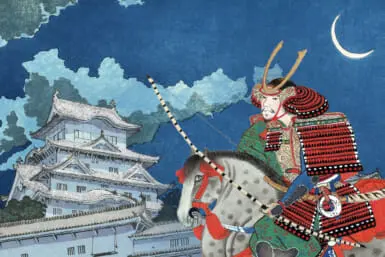Despite oft-repeated claims that Japan has one of the most homogenous societies on the planet, Japanese people and their culture are actually as diverse as any other nation on the planet. They are not a monolith, and this extends to their sense of humor, which is multifaceted and varied and the best way to understand it is by watching Japanese comedies. The following five are a good place to start:
5. Turtles Are Surprisingly Fast Swimmers (2005)
On the surface, TASFS tells the story of a bored housewife who becomes a spy, but the actual plot of the movie is really more of a a collection of scenes of everyday life that briefly get disrupted by the arrival of the weird and the unusual. A plumbing problem is dealt with by an insane, over-the-top plumber. A fishing trip is cut short by the discovery of a dead body. A walk up the stairs results in being buried under an avalanche of apples.
All of this is actually a popular form of Japanese humor which goes back all the way to rakugo (humorous storytelling): the introduction of chaos to everyday life. Japanese people don’t mind their humor getting really out there but they prefer that it starts in a familiar, realistic place, and that’s what Turtles Are Surprisingly Fast Swimmers is all about.
4. A Farewell to Jinu (2015)
Takeharu Takami is a bank teller who one day develops a phobia of money. The sight of cash causes him to panic so he moves away to a small village in the Tohoku region and tries to live without jinu (the local dialect for “cash.”) But what may seem like a straightforward screwball comedy is, at its core, smart satire. Japanese satire isn’t as popular as it once was but the country has produced some great literary examples of it like Natsume Soseki’s I’m a Cat (1906) or Ryunosuke Akutagawa’s Kappa (1927). A Farewell to Jinu follows closely in their footsteps with its farfetched premise and sharp observations on society.
Takeharu’s reactions to banknotes and coins are exaggerated for comedic effect but his quest for a cashless life forces us to question the importance that we place on money. Maybe there is a way to live without it or just not make it our lives’ purpose. And if you can make the audience laugh while making them ponder those questions, all the better.
Crayon Shin-chan: Fierceness That Invites Storm! The Adult Empire Strikes Back (2001)
A popular form of Japanese comedy is manzai, a sort of modern double act not unlike the works of Abbott and Costello. It consists of the straight man (tsukkomi) and the funny man (boke), although both roles usually involve being loud, brazen and just a little insensitive. And if that’s what Japanese people find funny, then the key to understanding a large part of their humor is Crayon Shin-chan, a popular manga/anime character known for his spirited, opinionated, butt-joke-loving personality. And The Adult Empire Strikes Back, the ninth film in the franchise, is probably the best way to understand Shin-chan.
The movie centers around all the adults reverting back to their younger selves, becoming crude and irresponsible and leaving their children to fend for themselves and save the entire world. The movie has tons of energy that borders on the chaotic, throwing joke after joke at you with such loud intensity, it’s easy to get overwhelmed. But that’s just one of the ways that Japanese people like their humor.
2. It’s Tough Being a Man (1969)
https://youtu.be/0HoRb0ewoxQ
Japan loves an underdog and there’s no bigger underdog than Tora-san, the lovable though occasionally acerbic vagabond and protagonist of the Otoko wa Tsurai yo (~”It’s tough being a man”) movies. The franchise actually holds the Guinness World Record for the longest running movie series with the same main actor, and over the years, it has made Tora-san into a national icon. It’s Tough Being a Man (1969), also known as Tora-san Our Lovable Tramp, is the movie that started it all.
A big draw of Tora-san is that he looks like a regular person. He isn’t a handsome superstar but rather a regular guy who never seems to catch a break. It’s easy for Japanese people to see themselves in him. At the same time, Tora-san often flaunts social norms and bluntly speaks his mind, something that many people might feel they cannot do. In the end, though, no matter how much he screws up, his family and friends still accept and love him, and all those elements (familiarity, wish-fulfillment and a happy ending), make for the most popular comedies in Japanese history.
1. Cyborg She (2008)
Upon its release, Cyborg She wasn’t any kind of financial or critical hit, but it plays with so many Japanese comedy tropes that it deserves a closer look. For one, its premise is ludicrous, telling the story of a young student dating a robot from the future, almost like some Frankenstein-esque blending of a dating sim and Doraemon. This lends itself to other Japanese comedy formulas like the disruption of the ordinary by scenes when, say, the cyber-girlfriend cooks the main protagonist, Jiro, his pet iguana. The fact that Jiro himself is a loser underdog only adds to Cyborg She being a Japanese Comedy 101 lesson in movie form.
What cements this is the romantic angle. The romantic comedy is one of the most popular forms of humorous cinema in Japan, probably for the same reason why the genre is still fairly big in the West. Near everyone has been in love at least once, and knows that it’s not a small thing. It turns your whole world upside down and makes you dumber, which is why it is so easy to explore through the most outrageous lenses out there. And that’s Cyborg She. It might not be groundbreaking but it’s pretty educational when it comes to explaining what many Japanese people find funny.









